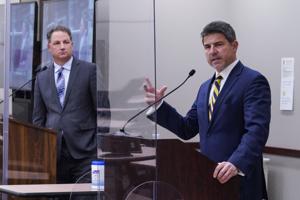Indiana legislature won’t take action on vaccine exemptions until January

(The Center Square) – In a change of plans, Indiana Senate President Rodric Bray, R-Martinsivlle, announced Wednesday the legislature won’t meet for a special session Nov. 29 to pass a bill that would have strengthened the exemptions to the COVID-19 vaccine for hundreds of employees around the state, many of whom have been fired or are about to be fired after their employers denied their exemption requests.
In a seven-hour hearing Tuesday at the Indiana Statehouse, more than 60 people testified, including several nurses from Ascension St. Vincent Hospital and several employees who work at Crane Naval Base in Green County, as well as others who said they will be fired Jan. 4 for not getting the vaccine.
The hearing was held before the House and Senate Rules committees for legislation that was to be formally introduced and then passed by both chambers Nov. 29. The legislation also included three provisions requested by Gov. Eric Holcomb as a condition of his allowing the public health emergency to expire on Dec. 1.
In a statement, Bray said that more time was needed to consider the language of the bill given the testimony presented Tuesday and criticized employers who “callously” disregarded legitimate requests for religious and medical exemptions.
“Yesterday, lawmakers heard heartfelt input from employees with medical or religious objections who are being asked to choose between complying with a Covid-19 vaccine mandate and losing their jobs, and testimony from employers striving to provide safe work places while navigating the imposition of an overreaching federal mandate,” Bray said. “Two especially concerning issues raised that deserve particular attention are the reports of some employers callously disregarding or denying without due consideration the legitimate medical or religious exemption requests of employees, as well as some businesses reportedly informing employees that noncompliance will be considered a voluntary resignation, rather than a termination. If true, this last item not only forces some employees to choose between their health or religion and their job, but also completely mischaracterizes the end of the employee/employer relationship and puts the employee’s ability to claim unemployment at risk.”
In the statement, Bray said additional testimony may be taken by the General Assembly when it convenes in early January for the regular start of the new session.
“Due to the urgency of these matters, a plan was in place to reconvene the legislature Monday, Nov. 29 to address these issues in a single day if consensus on action items existed,” Bray said. “The ongoing complexities of the issues raised and the potential for unintended consequences, the logistics of moving legislation to the floor during a time when the General Assembly is not typically in session, and the need for the public and members of the General Assembly to fully vet the legislation have led to the conclusion that efforts to gather input and better solutions should continue until the legislature reconvenes in January. These matters will be taken up in earnest at the outset of the coming legislative session.”
Following the news from the General Assembly, Gov. Eric Holcomb’s office sent out a statement saying that the governor will again extend the public health emergency for another 30 days.
“Last week I made clear what would be necessary to responsibly allow the state public health emergency to expire,” Holcomb said in the written statement. “However, following the announcement that the General Assembly will not return on Monday, Nov. 29, I plan to extend the public health emergency and the executive order next week for another 30 days to preserve the necessary provisions.”
Those provisions included allowing a waiver for the state to continue to receive the additional federal funds for Medicaid and the SNAP program that it has been receiving during the emergency and also allowing a waiver for children ages 5-11 to be vaccinated outside of doctors’ offices.
The language on vaccine exemptions had been added to the draft bill that had these provisions in it and would have required that employers grant religious exemptions without question to employees who had requested them in a letter stating a “sincerely held religious belief.” It also would have carved out an exemption for natural immunity, with a letter from a doctor, for a six-month period after a person has recovered from COVID-19 and also would have allowed exemptions for women who are pregnant or anticipating becoming pregnant.
Rep. Curt Nisly, R-Milford, who had authored a resolution to immediately end the emergency, said he thought it was a victory, saying what the legislature was trying to do was “ram through the governor’s request for more permanent overreach.”
He’d circulated a petition in recent days calling for an end to the state of emergency “without strings attached,” and said the cancellation of the Nov. 29 special session represented a victory for the people.
Disclaimer: This content is distributed by The Center Square

